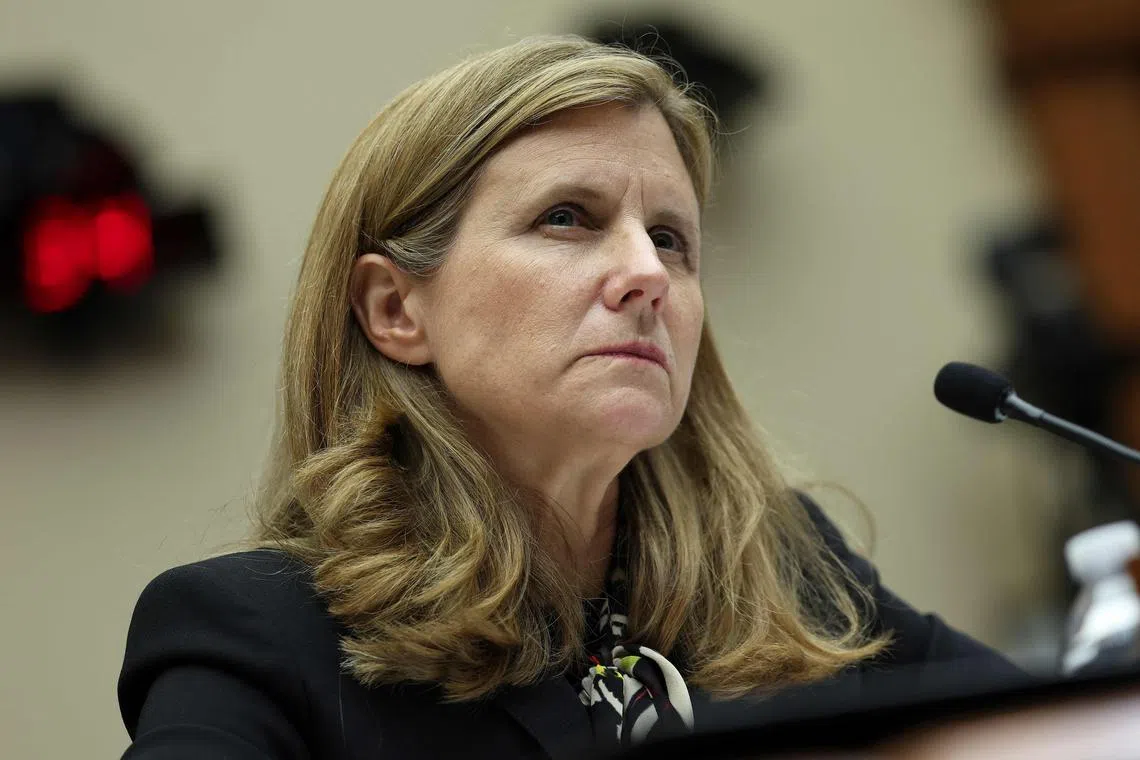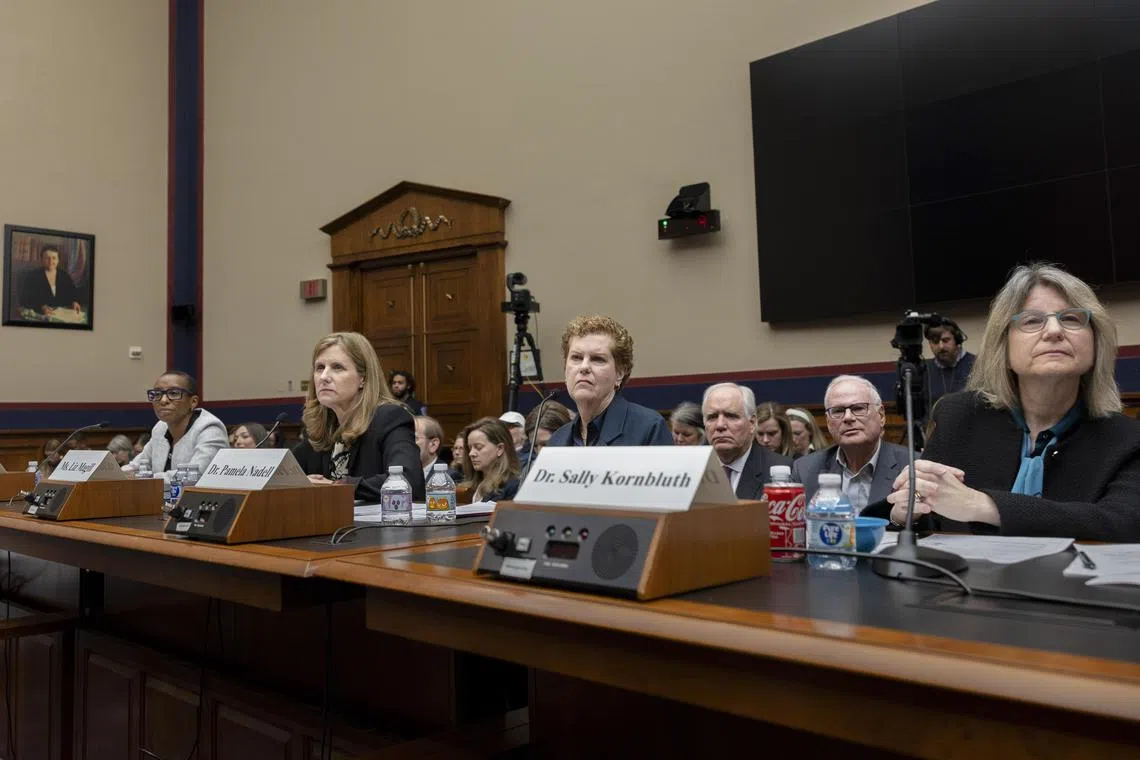University of Pennsylvania president resigns amid controversies over anti-Semitism
Sign up now: Get ST's newsletters delivered to your inbox

Professor Elizabeth Magill is the first president to resign in connection with the uproar that has engulfed campuses since the Oct 7 attacks.
PHOTO: AFP
Follow topic:
WASHINGTON - The president of the University of Pennsylvania, Professor M. Elizabeth Magill, resigned on Dec 9, four days after her testimony at a congressional hearing
Support for Prof Magill, already shaken in recent months over her approach to a Palestinian literary conference and the university’s initial response to the Hamas attack on Israel on Oct 7,
Influential graduates questioned her leadership, wealthy contributors moved to withdraw donations and public officials besieged the university to oust its president.
By the evening of Dec 9, a day before Penn’s board of trustees was expected to meet, Prof Magill said that she would quit. Mr Scott L. Bok, the board’s chair, said in an email to the Penn community that Magill had “voluntarily tendered her resignation”.
Less than two hours later, Mr Bok announced that he, too, had resigned, deepening the turmoil at one of the nation’s most prestigious universities.
Prof Magill is the first university president to step down in connection with the uproars that have engulfed campuses since the Hamas attack and Israel’s subsequent invasion of the Gaza Strip.
Other presidents remain under pressure. On Dec 8, more than 70 members of Congress called for the firings of Prof Magill and two presidents who appeared alongside her in Washington on Dec 5, Professor Claudine Gay of Harvard and Dr Sally Kornbluth of the Massachusetts Institute of Technology.
But her resignation has alarmed faculty members worried about academic freedom. In response to Prof Magill’s resignation, a group of Penn professors denounced what they saw as outside interference that imperilled the university’s integrity.
Prof Magill, in a two-sentence statement on Dec 9, made no reference to the outrage surrounding her testimony.
She said only, “It has been my privilege to serve as president of this remarkable institution. It has been an honour to work with our faculty, students, staff, alumni and community members to advance Penn’s vital missions.”
Mr Bok said that Prof Magill, who became Penn’s president in 2022, would remain as the university’s leader until an interim president is chosen. She will also stay at Penn as a faculty member in the law school. Mr Bok’s resignation took effect immediately.
Since Oct 7, university presidents have sought to balance the free-speech rights of pro-Palestinian demonstrators with fears that some of their language is anti-Semitic. But Prof Magill’s lawyerly approach to her own speech during her appearance before a House committee on Dec 5 immediately left her vulnerable to attacks.
At the hearing, Representative Elise Stefanik of New York had chanted support for intifada, an Arabic word that means uprising and that many Jews hear as a call for violence against them.
“Calling for the genocide of Jews,” Ms Stefanik asked, “does that constitute bullying or harassment?”
Prof Magill replied, “If it is directed and severe, pervasive, it is harassment.”
Ms Stefanik responded, “So the answer is yes.”
Prof Magill said, “It is a context-dependent decision, congresswoman.”
Ms Stefanik exclaimed: “That’s your testimony today? Calling for the genocide of Jews is depending upon the context?”
After Prof Magill’s appearance, Mr Bok said in an e-mail on Dec 9 that “it became clear that her position was no longer tenable, and she and I concurrently decided that it was time for her to exit”.
He also defended Prof Magill.
“Worn down by months of relentless external attacks, she was not herself” on Dec 5, he wrote.
“Over-prepared and over-lawyered given the hostile forum and high stakes, she provided a legalistic answer to a moral question, and that was wrong. It made for a dreadful 30-second sound bite in what was more than five hours of testimony.”
Prof Magill’s critics, who broadly welcomed her resignation, gave her no such respite. They also sought to use Prof Magill’s resignation to pressure Harvard and MIT to act, after Prof Gay and Dr Kornbluth offered similar testimony.
“One down. Two to go,” Ms Stefanik said in a statement on Dec 9. “This is only the very beginning of addressing the pervasive rot of anti-Semitism that has destroyed the most ‘prestigious’ higher education institutions in America. This forced resignation of the president of Penn is the bare minimum of what is required.”

(From left) Professor Claudine Gay of Harvard, Professor Elizabeth Magill of the University of Pennsylvania, Professor Pamela Nadell of American University and Dr Sally Kornbluth of the Massachusetts Institute of Technology, at a House Committee on Education and the Workforce hearing on Dec 5, 2023.
PHOTO: NYTIMES
Prof Gay has given no indication that she is considering resigning, and the executive committee of MIT’s governing board has declared its support for Dr Kornbluth.
Prof Magill came to Penn as a respected legal scholar who had led Stanford Law School and served as the provost at the University of Virginia, where she had received her law degree and taught.
Some faculty members and students said on Dec 9 that they believed Prof Magill had little choice but to go, either because of her words or because the response to them would leave her ineffective.
Jewish first-year student at Penn Beni Ramm said Prof Magill’s resignation was a personal matter but he hoped it would deter calls for violence against Jews.
“I wish the university had been more forceful in condemning calls for intifada, and I wish President Magill had been more forceful in Congress,” he said outside the Hillel house on the Penn campus in Philadelphia.
Wharton’s advisory board, which had been lobbying for Prof Magill’s ouster for days, said it anticipated working with the board “to take immediate action to improve the safety and security of the entire Penn community”.
In a statement, the board added: “We plan to work closely with the board of trustees to ensure that Penn’s next president and chair reflect and uphold our values.”
Trustees, however, will face at least one faction of worried faculty members.
The Penn chapter of the American Association of University Professors said on Dec 9 that “the ability of donors, lobbying groups, and members of Congress to destabilise the University of Pennsylvania reveals the need to restore a strong faculty voice in the governance of the institution.”
Prof Magill’s successor, the group added, “must correct what has become a dangerous myth suggesting that the defence of academic freedom and open expression is in any way contradictory to the fight against anti-Semitism”. NYTIMES

